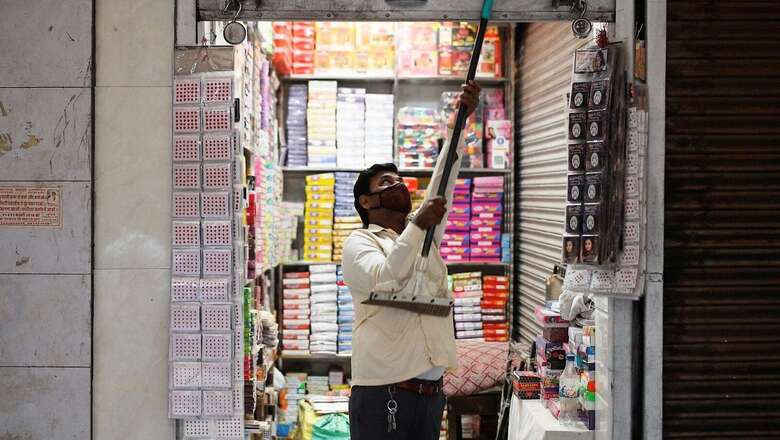
views
Amid a surge in Covid-19 cases across the country, the Delhi government on Tuesday (January 11) came down heavily on offices, business establishments and restaurants. According to the latest rules, Delhi government has ordered closure of all private offices, barring those listed in exempted category, all restaurants and bars have been ordered to shut dine-in services and essential category government offices will operate at 50 per cent capacity. This is near-lockdown situation, triggered by daily cases breaching 20,000-mark. However, such knee-jerk response without any scientific evidence shows that we have not learnt anything in the last two years of the pandemic. These stringent measures will not only cripple economic activities but may also prompt other states or city administration to follow the dangerous path and risk the lives of millions of poor.
Since the onset of Covid-19 pandemic, imposing ‘lockdown’ has become an easier tool for the administration irrespective of its efficacy. During the first wave, the central government announced the first nationwide lockdown for 21 days. Suddenly, all operations were stopped, supply chain froze, labourers could not enter factories and were stranded across states. It was a big jolt for the micro, small and medium enterprises or MSMEs. This resulted in drying up of cash flows. Asset side of the balance sheet shrank while the liability side swelled owing to employee salaries, rent, taxes, fixed charges for electricity and so on. This caused panic among entrepreneurs.
However, it was then a necessary and only tool available to restrict the spread of an unknown virus. In the early days, we neither had any scientific information about the virus’s transmissibility or virulence nor had any standard line of treatment or access to vaccines. We all witnessed the health crisis coupled with an economic and humanitarian crisis unfolding as an after-effect of the lockdown.
Our economy and businesses have suffered devastating impact of the lockdown and looming uncertainties since the last two years. International Monetary Fund (IMF) has termed it the ‘worst economic downturn since the great depression’. Overall, India’s economic activity shrunk by -7.3 per cent during the year 2020-21, the labour market and the MSME sector have suffered acute losses. According to International Labour Organization (ILO) “… in India, with a share of almost 90 per cent of people working in the informal economy, about 400 million workers in the informal economy are at risk of falling deeper into poverty during the crisis.”
Government of India was quick to respond with an economic package of Rs 20 trillion (almost 10 per cent of GDP). This recovery package alleviated some burden of the poor by ensuring free ration and cooking fuel. It also ensured credit guarantee for businesses, but the looming uncertainties of Covid-19 waves across the world continue to dampen the entrepreneurial spirit thereby affecting employment and economic cycle.
The purpose of lockdown or stringent restrictions is to avoid aggregation and prevent spread of the virus to a larger population. Thus, we begin with 50 per cent capacity utilisation for hotels, restaurants, theatres and limit the operating hours for grocery stores. This 50 per cent limit is illogical and mythical. Such disruption only brings uncertainty and often gives rise to panic and defeats the purpose. There are hardly any studies which have shown effectiveness of such random measures. There is no doubt that Covid-19 is an airborne disease and aggregation is the mode of dissemination. Keeping this in mind, operating hours for commercial activities should be increased and not otherwise. Other crowding events particularly social gatherings during weddings, funerals and unwarranted travels can be restricted.
Another casualty of lockdown policies are school-going children. Besides economic and livelihood loss, Covid-induced lockdown is robbing an entire generation of education. Economic losses can be recovered but school lockouts in comparison may have a longer and deep-rooted impact on society and future economy. The Annual Status of Education Report (ASER-2021) by Pratham foundation observed an increase in dependence on private tuitions and an absence of ready access to smartphones. Specific attention is needed to help address the learning losses, especially at the primary school level. This disruption in education has severe economic implications too. A World Bank report, ‘Beaten or Broken: Informality and COVID-19 in South Asia’, has quantified the impact of school closures in monetary terms — India is estimated to lose $440 billion (Rs 32.3 lakh crore approx.) in possible future earnings.
Omicron, the recent variant, appeared in the last week of November in South Africa and has since spread across the world in a few weeks’ time. Data suggests it is far milder than Delta. The potential for hospitalisation and critical illness is far less. But, it does have the potential to cause a breakdown of the health infrastructure as we are witnessing in western countries. At the same time, with Covid-appropriate behavior, health infrastructure preparedness and vaccine coverage, we can overcome the pandemic. Instead of pressing the panic button of lockdown every time with a new variant, we must reflect, learn and take graded yet cautious approach.
Sudhir Mehta is Chairman and Managing Director, Pinnacle Industries Limited, Pune; President, Mahratta Chamber of Commerce, Industries and Agriculture (MCCIA), Pune; Lead and Coordinator, Pune Platform for COVID-19 Response. The views expressed in this article are those of the author and do not represent the stand of this publication.
Read all the Latest Opinions here


















Comments
0 comment